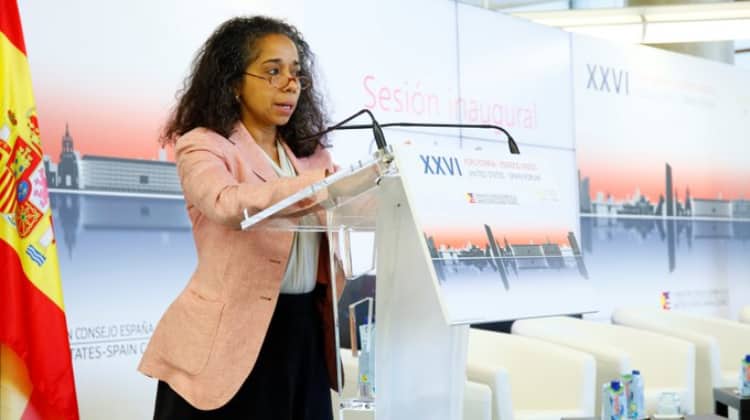The Diplomat
The 26th edition of the Spain-US Forum held on Friday and Saturday in Bilbao served to reinforce the alliance between the two countries, just a few days after a new joint declaration was signed during the visit of the US President, Joe Biden, to Madrid on the occasion of the NATO Summit.
Organised by the Spain-United States Council Foundation and the United States-Spain Council, the forum, which, since 1995, has been held annually alternately in the two countries, should have been held in 2020, but had to be postponed due to the COVID-19 pandemic.
It was inaugurated on Friday in the presence of the President of the Spain-US Council Foundation, Juan Lladó, and the US Congressman and Honorary President of the United States-Spain Council, Joaquín Castro, as well as the Spanish Ambassador in Washington, Santiago Cabanas, and the US Ambassador in Madrid, Julissa Reynoso.
More than 130 leaders from the public and private sectors debated current strategic issues on the agendas of both countries, including green finance, cities and security, and had the opportunity to listen to Foreign Affairs Minister José Manuel Albares at dinner on Friday, who stressed that the forum was being held at an exceptional moment for Spain-US transatlantic relations, following the Joint Declaration of both countries.
Albares expressed his conviction that the Forum was “a new opportunity to continue strengthening the strategic ties between the two countries”, words which he said were in line with the agreement reached at the meeting between Biden and the President of the Government, Pedro Sánchez, for the United States to send two more destroyers to the Rota naval base, which will be added to the four that already exist.
He also stressed that the NATO summit held in Madrid sent a “loud and clear message of unity and firmness” from all those who believe in democratic values “in the face of those who want to deplore them”.
In her speech at the opening session, the US ambassador also referred to the ties between the two countries and recalled Biden’s words in which he described Spain as an “indispensable ally”. Julissa Reynoso alluded to Biden’s “long meeting” with Sánchez and the “warm and very important” meeting with King Felipe VI. “Spain has made an exhibition of hospitality,” she said, referring to the NATO summit.
She insisted on the “ties” and the “close relationship” that has united Spain and the US “for centuries”. “It is strong and based on friendship and shared values. This relationship is not only important for the economy and our security; it is also important for maintaining our efforts to promote democracy and stability throughout the world, especially in Latin America,” she said.
Finally, she called for cooperation between the two countries and also to work on issues such as strengthening the role of minorities and the use of Spanish in the United States.
For his part, the Spanish Ambassador in Washington recalled the important role played by historical figures such as Bernardo de Gálvez in the American War of Independence and welcomed the “success” of the NATO Summit held in Madrid.
After considering that the events had marked an “important moment” in bilateral relations between the United States and Spain at a time of “change”, Santiago Cabanas called for the defence of “shared democratic values” at a time when “representative democracy” is “at stake”.
He stressed the need to increase relations between governments, parliaments, companies and civil society, and expressed his confidence that, just as the NATO summit has been a “turning point” in the friendship between the USA and Spain, the Bilbao Forum will also be a turning point.
In the inaugural session, Juan Lladó recalled the 25 years of the Spain-US Council Foundation and warned of the challenges posed by issues such as Russia’s invasion of Ukraine, inflation and limitations in supply chains in the wake of the covid-19 pandemic.
“We have to think and talk about the economy between the two parties”, said the President of the Spain-USA Council Foundation, while highlighting the vocation of Spain and the USA to be “allies and friends”.
Finally, the US Congressman and Honorary President of the United States-Spain Council, Joaquín Castro, defended the role of the United States as a “friend of the nations of the world” and, in particular, its vocation as an “ally” of countries such as Spain.
The debates, which were held behind closed doors, featured speakers from the United States and Spain, such as Enrique Lores, Chairman and CEO of the US multinational Hewlett Packard; Antony Cook, Corporate Vice President and Deputy General Counsel of Microsoft; Jim Perschbach, President and CEO of the Port San Antonio Technology Innovation Campus in Texas; Ángeles Moreno, Secretary of State for Foreign and Global Affairs of the Spanish Ministry of Foreign Affairs; Gina Ortiz Jones, Under Secretary of the US Air Force, and Juan Mari Aburto, Mayor of Bilbao.
Also participating in the sessions were José Ignacio Goirigolzarri, Chairman of CaixaBank; José W. Fernández, Under Secretary for Economic Growth, Energy and Environment of the US Department of State; Andy Brown, Judge of Travis County (Texas); Eduardo Serra, President of NTT DATA EMEAL and former Minister of Defence; Hugo Morán, Secretary of State for the Environment; Roberto San Salvador, Director of the Deusto Cities Lab Katedra; and the American actress and producer, Eva Longoria, who spoke about the need to change the stereotypes associated with the Hispanic community in television and film productions.







